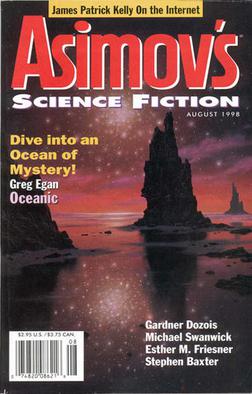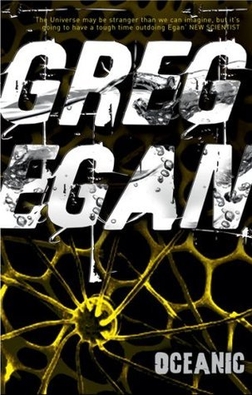Greg Egan is an Australian science fiction writer and mathematician, best known for his works of hard science fiction. Egan has won multiple awards including the John W. Campbell Memorial Award, the Hugo Award, and the Locus Award.

Incandescence is a 2008 science fiction novel by Australian author Greg Egan. The book is based on the idea that the theory of general relativity could be discovered by a pre-industrial civilisation.

"Oceanic" is a science fiction novella by Australian writer Greg Egan, published in 1998. It won the 1999 Hugo Award for Best Novella.
83D/Russell is a periodic lost comet in the Solar System with an orbital period of about 7.5 years. On the post-1988 orbit the comet probably does not get brighter than about apparent magnitude 21. The comet might come to perihelion in late May 2021, but the uncertainty in the comet's position is a few million km.

The Best of Greg Egan is a collection of science fiction stories by Australian writer Greg Egan, published by Subterranean Press in 2019.
Dark Integers and Other Stories is a collection of five science-fiction short stories by Australian writer Greg Egan, published on 25 March 2008 by Subterranean Press. One of them, "Oceanic", won the Hugo Award for Best Novella, while two others were nominated.

Oceanic is a collection of 12 science fiction short stories by Australian writer Greg Egan, published on 16 July 2009 by Gollancz.
"Dark Integers" is a science-fiction short story by Australian writer Greg Egan, first published in Asimov's Science Fiction in October/November 2007. The short story was included in the collections Dark Integers and Other Stories in 2008, Oceanic in 2009 and The Best of Greg Egan in 2020. It was nominated for the Hugo Award for Best Novelette in 2008. It is a sequel to the short story "Luminous".
"Reasons to Be Cheerful" is a science-fiction short story by Australian writer Greg Egan, first published in Interzone 118 in April of 1997. The short story was included in the collections Luminous in 1998 and The Best of Greg Egan in 2020.
"Crystal Nights" is a science-fiction short story by Australian writer Greg Egan, first published in Interzone 215 in April 2008.
"Appropriate Love" is a science-fiction short story by Australian writer Greg Egan, first published in Interzone #50 in August 1991. The short story was included in the collection Axiomatic in 1995 and The Best of Greg Egan in 2019.
"Chaff" is a science-fiction novelette by Australian writer Greg Egan, first published in Interzone #78 in December 1993. The novelette was included in the anthology The Year’s Best Science Fiction: Eleventh Annual Collection edited by Gardner Dozois in 1994 and in the collections Our Lady of Chernobyl in 1995, Luminous in 1998 and The Best of Greg Egan in 2019.
"Into Darkness" is a science-fiction novelette by Australian writer Greg Egan, first published in Asimov's Science Fiction in January 1992. The novelette was included in the collections Axiomatic in 1995 and The Best of Greg Egan in 2019.
"Riding the Crocodile" is a science-fiction novella by Australian writer Greg Egan, first published in One Million A.D. edited by Gardner Dozois in December 2005. The novella was included in the collections Dark Integers and Other Stories in 2008 and Oceanic in 2009. The short story is set in the same universe as Egan's short stories "Glory" and "Hot Rock" as well as Egan's novel Incandescence.
"Unstable Orbits in the Space of Lies" is a science-fiction short story by Australian writer Greg Egan, first published in Interzone #61 in July 1992. The short story was included in the collections Axiomatic in 1995 and The Best of Greg Egan in 2019.
"Silver Fire" is a science-fiction short story by Australian writer Greg Egan, first published in Interzone #102 in December 1995. The short story was included in the collections Luminous in 1998 and The Best of Greg Egan in 2019.
"Zero for Conduct" is a science-fiction short story by Australian writer Greg Egan, first published in Twelve Tomorrows edited by Stephen Cass in September 2013. The short story was included in the anthology The Year's Best Science Fiction: Thirty-First Annual Collection edited by Gardner Dozois in July 2014 as well as the collections The Best of Greg Egan in 2019 and Instantiation in 2020.

Phoresis and Other Journeys is a collection of three science-fiction novellas by Australian writer Greg Egan, published in 2023.
Instantiation is a collection of eleven science-fiction short stories by Australian writer Greg Egan, published in 2020.
Sleep and the Soul is a collection of ten science-fiction short stories by Australian writer Greg Egan, published in 2023.





